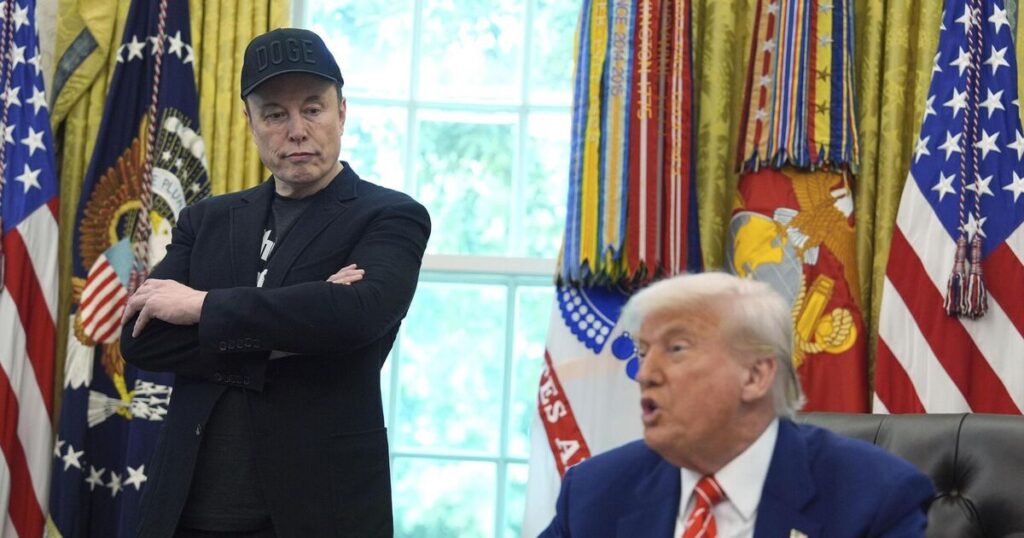US President Donald Trump on Tuesday threatened to cut off the billions of dollars in subsidies that Elon Musk’s companies receive from the federal government, in an escalation of the war of words between the president and the world’s richest man, one-time allies who have since fallen out.
The feud reignited on Monday when Musk, who spent hundreds of millions on Trump’s re-election, renewed his criticism of Trump’s tax-cut and spending bill, which would eliminate subsidies for electric vehicle purchases that have benefited Tesla, the leading US EV maker. That bill passed the Senate by a narrow margin midday Tuesday.
“He’s upset that he’s losing his EV mandate and … he’s very upset about things but he can lose a lot more than that,” Trump told reporters at the White House on Tuesday.
Though Musk has often said government subsidies should be eliminated, Tesla has historically benefited from billions of dollars in tax credits and other policy benefits because of its business in clean transportation and renewable energy.
The Trump administration has control over many of those programs, some of which are targeted in the tax bill, including a $7,500 consumer tax credit that has made buying or leasing EVs more attractive for consumers.
Tesla shares dropped more than 5.5% Tuesday.
The Tesla CEO renewed threats to start a new political party and spend money to unseat lawmakers who support the tax bill, despite campaigning on limiting government spending. Republicans have expressed concern that Musk’s on-again, off-again feud with Trump could hurt their chances to protect their majority in the 2026 midterm congressional elections.
Treasury Secretary Scott Bessent pushed back on Musk’s criticism that the bill would balloon the deficit, saying, “I’ll take care of” the country’s finances.
Musk spearheaded the Department of Government Efficiency (DOGE), aimed at cutting government spending, before he pulled back his involvement in late May. Trump on Truth Social on Tuesday suggested Musk might receive more subsidies “than any human being in history, by far,” adding: “No more Rocket launches, Satellites, or Electric Car Production, and our Country would save a FORTUNE.”
Trump later doubled down, telling reporters with a smile, “DOGE is the monster that might have to go back and eat Elon.”
In response to Trump’s threats, Musk said on his own social media platform X, “I am literally saying CUT IT ALL. Now.”
He later added that he could escalate the exchange with Trump but said, “I will refrain for now.”
The feud could create new challenges for Musk’s business empire, particularly as the electric automaker — his primary source of wealth — bets heavily on the success of its robotaxi program currently being tested in Austin, Texas. The speed of Tesla’s robotaxi expansion depends heavily on state and federal regulation of self-driving vehicles.
“The substance of Tesla’s valuation right now is based on progress towards autonomy. I don’t think anything is going to happen on that front, but that is the risk,” said Gene Munster, managing partner at Tesla investor Deepwater Asset Management.
Analysts expect another rough quarter when the EV maker reports second-quarter delivery figures on Wednesday. Sales in major European markets were mixed, data showed Tuesday, as Musk’s embrace of hard-right politics has alienated potential buyers in several markets worldwide. The elimination of the EV credit could hit Tesla’s earnings by as much as $1.2bn, about 17% of its 2024 operating income, J.P. Morgan analysts estimated earlier this year.
Gary Black, a longtime Tesla investor who manages money for the Future Fund LLC, sold his shares recently as car sales declined. He told he is considering when to reinvest and that eliminating electric vehicle credits would harm Tesla.
In a separate post on X, Black said: “Not sure why @elonmusk didn’t see this coming as a result of him speaking out against passage of President Trump’s big beautiful bill.”
The US Transportation Department regulates vehicle design and will play a key role in deciding if Tesla can mass-produce robotaxis without pedals and steering wheels, while Musk’s rocket firm SpaceX has about $22bn in federal contracts.
Tesla also gets regulatory credits for selling electric vehicles, and has reaped nearly $11bn by selling those credits to other automakers who are unable to comply with increasingly strict vehicle emissions rules. Without those sales, the company would have posted a first-quarter loss in April.
Trump had in early June threatened to cut Musk’s government contracts when their relationship erupted into an all-out social media brawl over the tax-cut bill, which non-partisan analysts estimate would add about $3tn to the US debt.
Asked if he was going to deport Musk, a naturalized US citizen, Trump told reporters as he left the White House on Tuesday: “I don’t know. We’ll have to take a look.”


